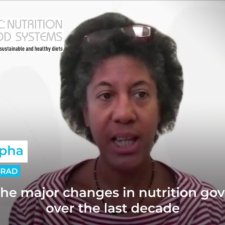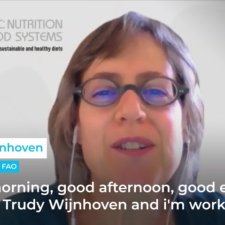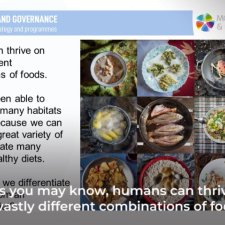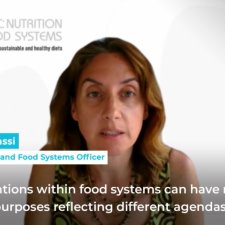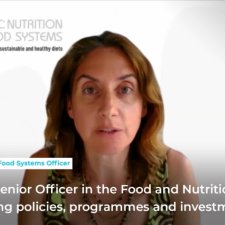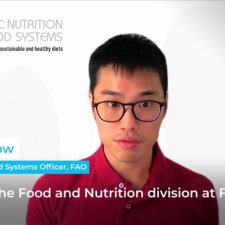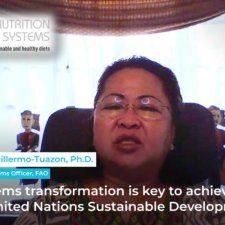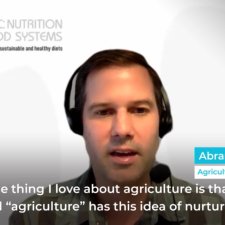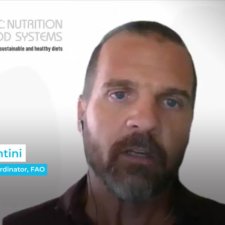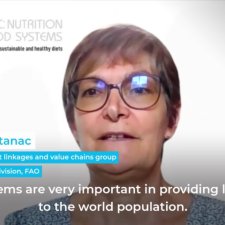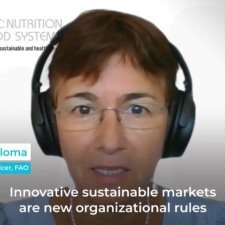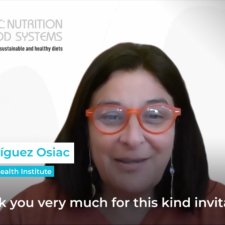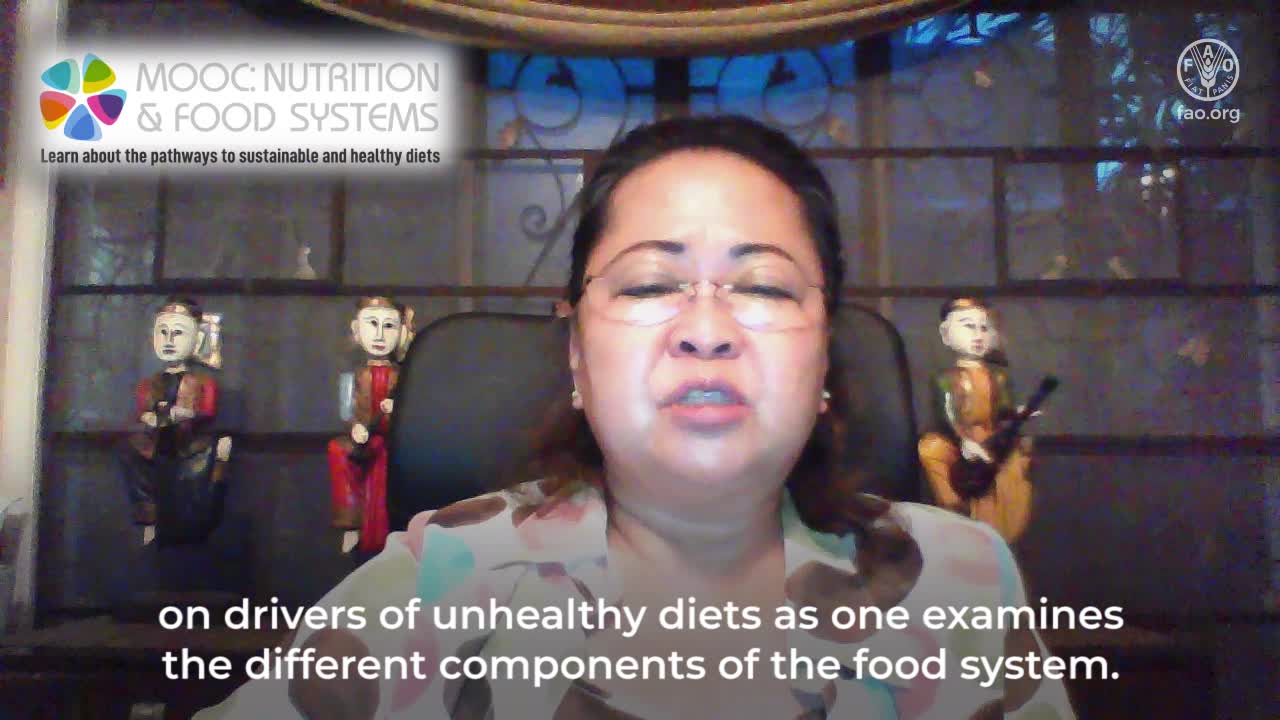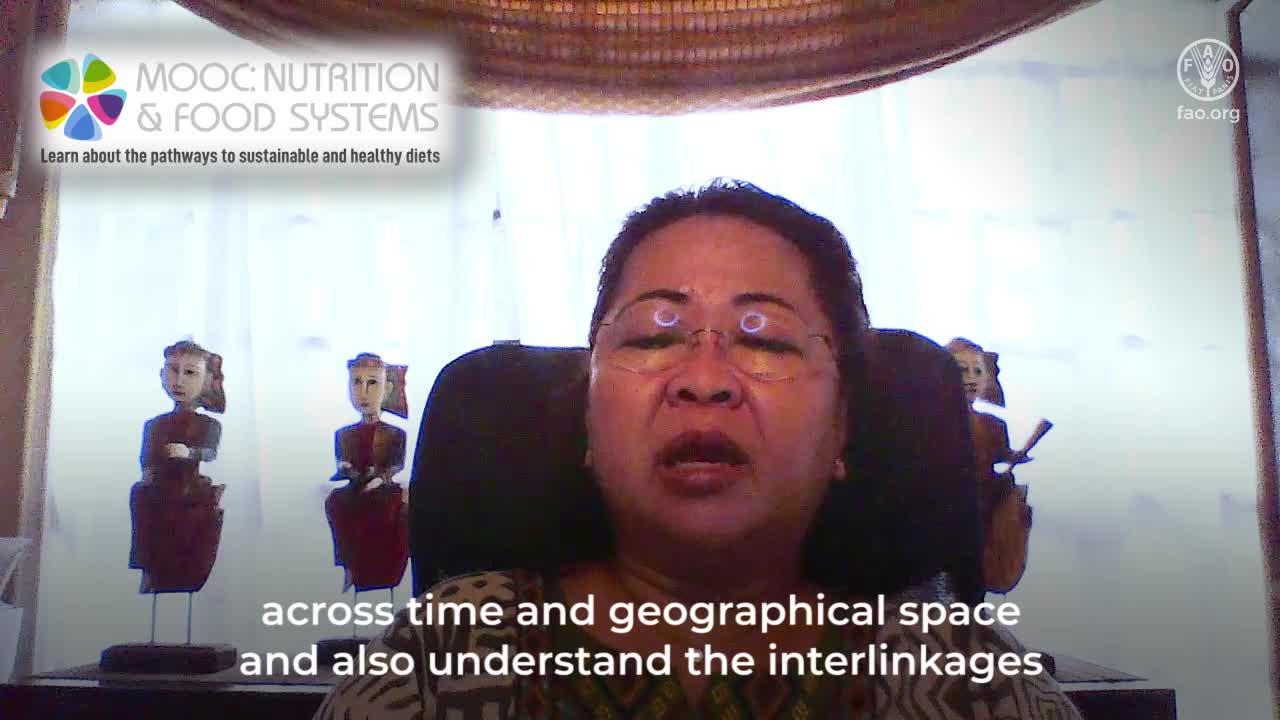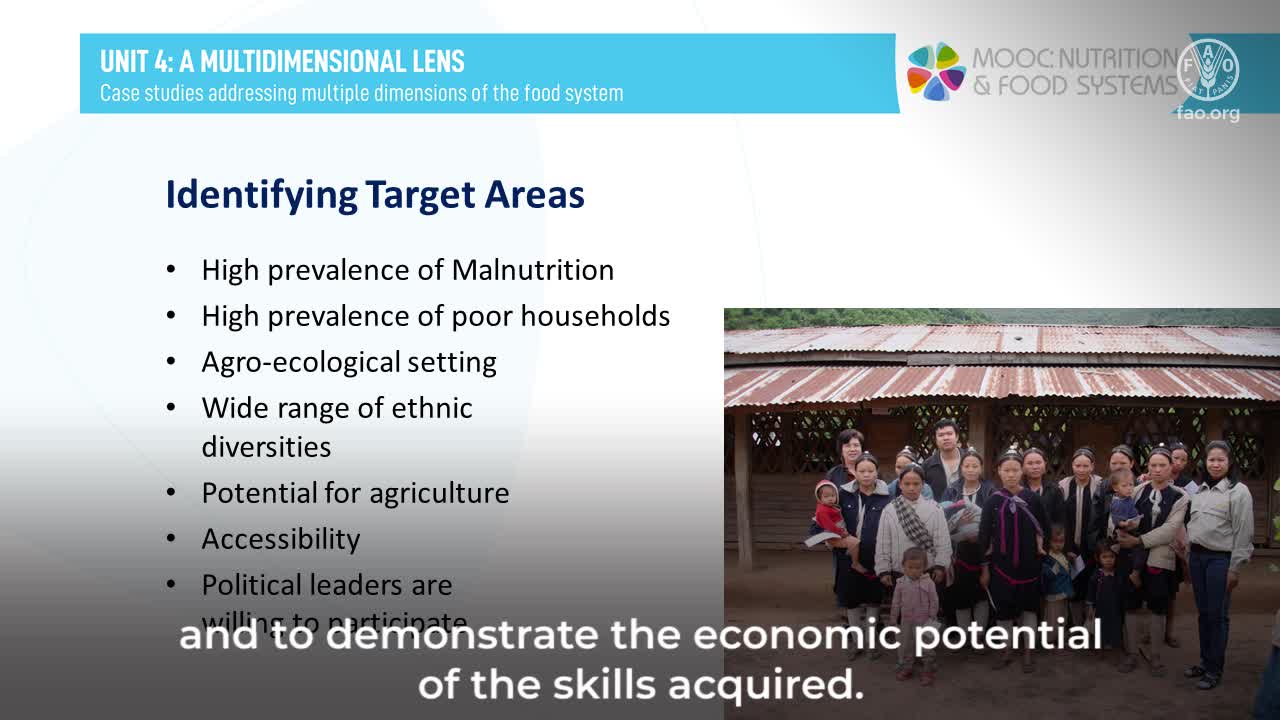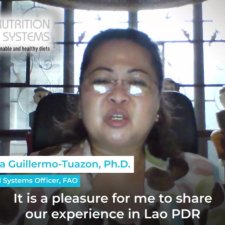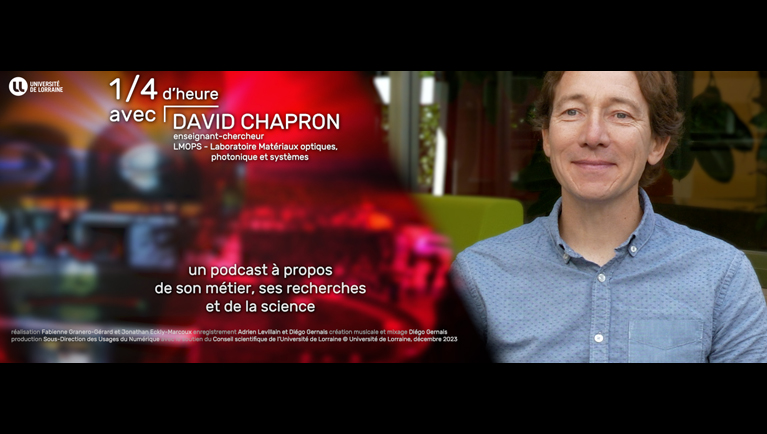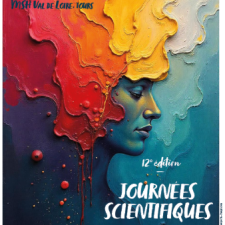Notice
From data to impact – Tools for gathering information and taking decisions. A word from the experts.
- document 1 document 2 document 3
- niveau 1 niveau 2 niveau 3
Descriptif
Interview with Maria Antonia Guillermo-Tuazon (Nutrition and Food Systems Officer, FAO) and Corné van Dooren (World Wildlife Fund Netherlands).
It is explained why indicators of dietary consumption and food diversity are used to monitor and evaluate the effects of interventions rather than stunting or wasting rates: interventions will have an impact on food consumption before the nutritional impact. Dietary indicators can also provide early warning signs of impending malnutrition in various forms.
Secondly, possibilities offered by new technologies to improve the collection and analysis of dietary data are mentioned, in particular by means of tablets or smartphones, or via telephone interviews; the possible modalities are diverse.
A question is raised about new dietary assessment tools in relation to systemic issues: dietary data, in combination with other indicators or variables, can shed light on the causes of unhealthy diets when looking at the different components of the food system.
The use of tools (advantages, disadvantages) for linear programming in the cost of the diet is also reviewed. These tools can be intelligently complemented by: adding additional rules; looking for synergies between health and sustainability; developing a theory of change.
Experiences show how far it is possible to go to make changes towards a more sustainable diet acceptable to consumers.
Pricing policies, including fiscal policies, can be effective in supporting these changes.
Intervention / Responsable scientifique
Dans la même collection
-
Lessons for food system policy, programs and governance – A word from the experts
AlphaArlèneBhattacharjeeLalitaInterview with Arlène Alpha (Researcher, CIRAD) and Lalita Bhattacharjee (Senior Nutrition Advisor, FAO Bangladesh) about food system policy, programs and governance.
-
United Nations Decade of Action on Nutrition 2016–2025
WijnhovenTrudyTrudy Wijnhoven (Nutrition Officer, FAO) gives presentation about the United Nations Decade of Action on Nutrition 2016–2025, also referred to as the Nutrition Decade.
-
Food-based dietary guidelines (FBDGs) to inform policies and programmes for food system transforma…
Islas RamosAnaAna Islas Ramos (Nutrition Officer, FAO) spoke about the use of FBDGs to inform policies and programmes to transform food systems.
-
Lessons for food system policy, programs and governance
FracassiPatriziaPatrizia Fracassi (Senior Nutrition and Food System Officer, FAO) explains (and gives examples) that interventions within the food systems can have competing priorities that require balancing risks
-
Nutrition-sensitive investment in agriculture and food systems - Budget analysis guidance note
FracassiPatriziaPatrizia Fracassi (Senior Nutrition and Food System Officer, FAO) presents FAO’s work on Budget Analysis for nutrition sensitive investments in agri-food systems.
-
The theory of change in programming for sustainable healthy diets - Understanding the system thinki…
SeowTi KianLorvaoClémentTi Kian Seow (Nutrition and Food Systems Officer, FAO) and Clement Lorvao (Senior Monitoring and Evaluation Expert, FAO) present how to use theories of change and impact pathways to mainstream
-
From data to impact – Tools for gathering information and taking decisions
Guillermo-TuazonMaria AntoniaMaria Antonia Tuazon (Nutrition and Food Systems Officer, FAO) addressed the issue of data collection for planning, monitoring and evaluating the transformation of food systems.
-
Systems approaches to food production and supply – a word from the experts
BickslerAbramPolo GalanteAndreaInterview with Abram Bicksler (Agricultural Officer, FAO) and Andrea Polo Galante, (Senior Nutrition Consultant, FAO) on linkages between healthy diets and food production and the sustainable food
-
The role of urban and periurban agriculture in promoting sustainable food systems
SantiniGuidoGuido Santini (Programme Coordinator, FAO) develops a presentation on the role of urban and periurban agriculture in promoting sustainable food systems in urban areas.
-
Systems approaches to food production and supply
TartanacFlorenceFlorence Tartanac (Senior officer, market linkages and value chains groups, FAO) looks at the definition of food systems and their role in providing a fair livelihood for the world's population.
-
Systems approaches to the food environment - A word from the experts
MattioniDaliaSantacolomaPilarInterview with Dalia Mattioni, Research Associate - FOODTRAILS project - School of Geography and Planning, Cardiff University) and Pilar Santacoloma, Agri-food Systems Officer, FAO, who explain how
-
Systems approaches to the food environment Law on food labelling and advertising: the Chilean exper…
Rodríguez OsiacLorenaDra. Lorena Rodríguez Osiac (Professor, Public Health Institute, University of Chile) presents the experience implemented in Chile on food labelling and advertising.
Avec les mêmes intervenants et intervenantes
-
Des données à l'impact - Outils pour la collecte d'informations et la prise de décisions. Le point …
Guillermo-TuazonMaria AntoniaVan DoorenCornéInterview de Maria Antonia Tuazon (Nutrition and Food Systems Officer, FAO) et Corné van Dooren (World Wildlife Fund Netherlands).
-
Des données à l'impact - Outils pour la collecte d'informations et la prise de décisions
Guillermo-TuazonMaria AntoniaMaria Antonia Guillermo-Tuazon (Nutrition and Food Systems Officer, FAO) aborde la question des données à collecter pour planifier, suivre et évaluer la transformation des systèmes alimentaires.
-
From data to impact – Tools for gathering information and taking decisions
Guillermo-TuazonMaria AntoniaMaria Antonia Tuazon (Nutrition and Food Systems Officer, FAO) addressed the issue of data collection for planning, monitoring and evaluating the transformation of food systems.
-
Exemple d'une intervention alimentaire et nutritionnelle multidimensionnelle : étude de cas en Répu…
Guillermo-TuazonMaria AntoniaMaria Antonia Guillermo-Tuazon (Chargée de la nutrition et des systèmes alimentaires, FAO) présente une étude de cas de la République démocratique populaire du Laos, sur le renforcement des capacités
-
Example of a multidimensional food and nutrition intervention: case study from Lao People's Democr…
Guillermo-TuazonMaria AntoniaMaria Antonia Guillermo-Tuazon (Nutrition and Food Systems Officer, FAO) presents a case from Lao People's Democratic Republic on capacity building for food security and better nutrition.
Sur le même thème
-
Podcast 1/4 d'heure avec : David Chapron, enseignant-chercheur au Laboratoire Matériaux optiques, …
ChapronDavidRencontre avec David Chapron - enseignant-chercheur au LMOPS (Laboratoire Matériaux optiques, photonique et systèmes).
-
-
02. Faire de son mieux (Avec Nathalie Vallet-Renart)
Vallet-RenartNathaliePodcast animé par Romain Poncet, ingénieur de recherche en sociologie.
-
-
05. Se plier en quatre (avec Marie Soulhac)
SoulhacMariePoncetRomainAnimation : Romain Poncet, ingénieur de recherche en sociologie.
-
00. Des comptables et des conteurs (Présentation avec Jean-Philippe Pierron)
PierronJean-PhilippeIntroduction à la série de podcasts "Aux Grands Remèdes les Petits Mots".
-
-
01. Le soin du détail (Avec Emilie Chanel)
PoncetRomainChanelEmilieCe podcast est proposé par la Chaire Valeurs du Soin, animé par Romain Poncet, ingénieur de recherche en sociologie.
-
-
-
03. Soignants ou Soi-Niant (Avec Sonia Benkhelifa)
BenkhelifaSoniaAnimation : Romain Poncet, ingénieur de recherche en sociologie.
-
Du pot aux recettes : expérimentation de préparations gauloises, romaines, médiévales et modernes,…
Roure-HorardMarie-PierreNous disposons, sur de nombreux sites archéologiques, de céramiques à usage culinaire gauloises, romaines, médiévales et modernes dont les argiles ont enregistré, par imprégnation, les marqueurs


